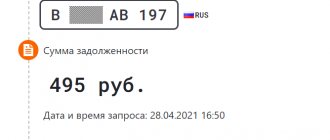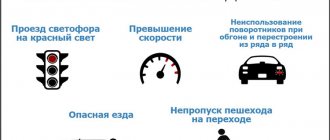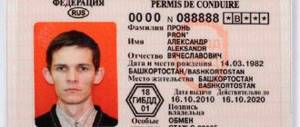The order to pay fines for violating the Traffic Rules, like any official document, has a fixed deadline for its execution.
The repayment period for traffic fines from May 9, 2013 is 60 days, which are calculated from the moment the resolution comes into force. And it comes into force immediately after the expiration of 10 days given for the possibility of appealing the fine to the State Traffic Inspectorate or court.
Today we will talk in detail about the nuances of calculating the repayment terms of administrative fines for traffic violations, point out the possibility of obtaining a deferment or installment plan for fines, and also talk about liability for their late payment.
What is the deadline for paying traffic fines?
To find out how long the law allocates for paying off fines for administrative offenses (including traffic violations), just refer to Article 32.2 of the Code of Administrative Offenses of the Russian Federation. It states that fines are paid in full within 60 days from the date of entry into force of the decision imposing an administrative fine.
When exactly does the resolution come into force? Let us turn for clarification to the full text of Article 31.1 of the Code of Administrative Offenses of the Russian Federation:
A decision in a case of an administrative offense comes into force:
1) after the expiration of the period established for appealing a decision in a case of an administrative offense, if the said decision has not been appealed or protested;
2) after the expiration of the period established for appealing a decision on a complaint, protest, if the said decision has not been appealed or protested, except in cases where the decision cancels the decision;
3) immediately after making a non-appealable decision on a complaint or protest, except in cases where the decision cancels the decision.
The driver is given exactly 10 days to appeal from the moment he receives the decision (or a copy thereof). If the decision was issued by a traffic police inspector, then the countdown of 10 days to appeal it begins immediately, that is, the next day will be the first.
If the decision came by mail (in the case where the violation was recorded by automatic traffic cameras), then the period is counted from the day it was delivered by the postman or from the day the driver received the mail notification.
Important! If you evade receiving the document, the resolution will inevitably return to the addressee (the traffic police authority) and will still come into force 10 days after the return.
As a result, we find that the time for paying the fine includes:
10 days (appeal) + 60 days (payment of fine) = 70 days (from the date of receipt of the decision)
Deadline for payment of an administrative fine
Each type of administrative punishment has its own execution procedure. The administrative fine was no exception.
Article 32.2. The Code of Administrative Offenses of the Russian Federation establishes a general deadline for paying the imposed fine. This is 60 calendar days from the date of entry into force of the decision on an administrative offense. Moreover, if an administrative fine is established by the law of a constituent entity of Russia, then the execution period is only the Code of Administrative Offenses of the Russian Federation.
According to the procedure for bringing to administrative liability, a resolution in a case of an administrative offense comes into force after the deadline for appeal has expired. If the violator does not file a complaint, then it is 10 days. From the day following the date of delivery by the authorized body of the decision on the case. Not a protocol on an administrative offense, but the results of its consideration.
So, if a person has not filed a complaint, as a general rule he pays the administrative fine before the expiration of 70 calendar days from the day following the date the decision in the case comes into force. Because such a general rule for calculating deadlines is Article 4.8 of the Code of Administrative Offenses of the Russian Federation. And if a person goes through the stages of appealing the decision, then the terms increase.
Transferring the fine to bailiffs
However, 70 days is not quite the correct period during which a driver can pay a fine without serious consequences. The fact is that after 70 days, the fine case is transferred to bailiffs for execution, and the law allots another 10 days for this procedure. That is, forced collection of a fine occurs only 80 days after receipt of the decision on the violation:
10 days (appeal) + 60 days (time to pay) + 10 days (the traffic police fine is handed over to the bailiffs) = 80 days
When the bailiffs find the debtors, they give them another 5 days to pay the fine voluntarily. In the case where the debtor was actively hiding from government officials and evading payment of the debt, the statute of limitations on his case (which for administrative fines is 2 years) is extended for the entire period while the offender was “on the run.” This will happen immediately after the bailiffs find the debtor.
It turns out that if during the statute of limitations for a traffic fine you actively avoid meeting with the bailiffs, then you should not count on the fact that after 2 years you will no longer be held accountable. But if for two years after the imposition of a traffic fine (and another 10 days that were given to appeal it) no one looked for the driver, then after their expiration no one will be able to request a fine.
Important! The statute of limitations should not be confused with the statute of limitations for holding people accountable for violating traffic rules. If after committing an offense within two or three (if the case is being considered by the court) months you have not been served with a decision, then responsibility for the offense does not arise.
Deferment and installment of fine payments
Sometimes the fine for violating the Traffic Rules is quite large, so the driver does not have the financial ability to pay it within the period allocated by law (70 days). In this case, he has the right to go to court, present evidence of poor financial situation (for example, a certificate of salary or lack of work) and ask for an installment plan or deferred payment. This possibility is reflected in Article 31.5 of the Code of Administrative Offenses of the Russian Federation.
What is the difference between installment plan and deferment?
- The deferment provides for a postponement of the payment deadline by 1 month, that is, the driver will have more time to pay off the traffic police fine;
- Installment plan – payment of the fine in installments over 3 months (the driver receives a monthly debt repayment schedule).
Responsibility for late payment of fines
What happens when the 70 days assigned to pay the fine expire? As we have already said, the case will be transferred to bailiffs, who have the right to apply the following types of punishment to the driver:
- a twofold increase in the amount of the fine (minimum by 1,000 rubles);
- assignment of community service for up to 50 hours;
- administrative arrest for up to 15 days.
The listed penalties are indicated in Part 1 of Art. 20.25 of the Code of Administrative Offenses of the Russian Federation and only a judge has the right to appoint them. In the vast majority of cases, a doubling of the fine is used. If community service is chosen as a punishment, it will not exceed 12 hours a week, which will force the driver to engage in community service for up to 2 months.
Important! Punishment in the form of arrest is applied only to the worst defaulters, who have a huge number of unpaid fines.
Bailiffs have the right to collect the assigned fine by seizing bank accounts or personal property of the defaulter. If the amount of debt exceeds 10 thousand rubles, then the debtor will be prohibited from traveling outside of Russia. By decision of the court, a special punishment may be applied to such fines - restriction of the validity of the driver's license.
The restriction is lifted only after all traffic police fines have been paid, and if the driver is caught driving a car with a limited license, then he faces real deprivation of his license for up to 1 year or 50 hours of community service.
Deadlines for repayment of administrative fines
According to current legislation, a citizen is given 10 days after receiving the notification to appeal the fine. To do this, you need to file an application with the court, indicating the reasons for your disagreement with the imposed sanction.
If the citizen does not appeal the fine or the complaint was found unfounded, he has 60 days to pay the established amount. You can reduce the amount of the sanction through a special discount. If the violator does not meet the specified deadline, then additional penalties may be applied to him.
- 6 Reasons for Low Energy in Men
- Pension card of the Bank of Moscow - opening conditions, tariffs and interest rates
- Illegally working pensioners will be heavily fined
Payment with a 50 percent discount
According to Federal Law No. 437-FZ “On Amendments to the Code of the Russian Federation on Administrative Offenses” dated December 22, 2014, from January 1, 2021, persons found guilty of violating the Traffic Rules can pay fines on preferential terms. When transferring money in the first 20 days after the decision is made, citizens receive a 50% discount.
This relief does not apply to certain types of violations:
- using a car without registration;
- running a red light;
- speeding by 40 km/h or more;
- driving while intoxicated;
- refusal to test for alcohol intoxication;
- causing minor or moderate harm to the health of a participant in a traffic accident.
Responsibility for violation of deadlines
If a citizen does not pay the fine within the period established by law, new penalties may be imposed:
- Double increase of the initial fine, but not less than 1000 rubles.
- Arrest for up to 15 days. The duration depends on the amount of debt.
- Mandatory work lasting up to 50 hours.
- Restriction on travel abroad.
The case may be transferred to bailiffs, who have the right to seize the citizen’s property. For example, a vehicle that violates traffic rules may be subject to such a sanction. The driver's license is taken away from the car owner, and he can get it back only by completely repaying the debt.
- Indexation of social pensions from April 1, 2021
- How to choose a ripe melon
- Urinary incontinence in women causes
Paying off a traffic police fine with a 50% discount
Since the beginning of 2021, a law has been in force in Russia to reduce fines for traffic offenses if they are paid within the first 20 days after the decision is issued. The discount in this case will be exactly 50% of the original fine amount (Part 1.3 of Article 32.2 of the Code of Administrative Offenses of the Russian Federation). If the execution of the decision on an administrative fine is delayed or spread out by the judge, then the 50% discount will not apply.
The discount on payment of a fine within 20 days after the driver receives the order is valid for all types of violations of the Traffic Rules, with the exception of those that are most dangerous to society, committed repeatedly or while intoxicated.
How long does it take to pay an administrative fine?
Good afternoon. How long does it take to pay an administrative fine?
Lawyer Antonov A.P.
Good afternoon
According to Article 32.2 of the Code of Administrative Offenses, an administrative fine must be paid in full by a person held administratively liable no later than sixty days from the date the decision to impose an administrative fine comes into force, except for the cases provided for in parts 1.1, 1.3 and 1.4 of this article, or from the date of expiration of the deferment period or installment plan period provided for in Article 31.5 of this Code. An administrative fine imposed on a foreign citizen or stateless person simultaneously with administrative deportation from the Russian Federation must be paid no later than the next day after the day the relevant resolution in the case of an administrative offense comes into force. An administrative fine imposed for committing an administrative offense provided for in Articles 11.26, 11.29, 12.9, parts 6 and 7 of Article 12.16, Article 12.21.3 of this Code must be paid before the vehicle owned by a foreign carrier, in which the administrative offense was committed, leaves the territory Russian Federation, but no later than the period specified in part 1 of this article. When an administrative fine is paid by a person held administratively liable for committing an administrative offense provided for in Chapter 12 of this Code, with the exception of administrative offenses provided for in Part 1.1 of Article 12.1, Article 12.8, Parts 6 and 7 of Article 12.9, Part 3 of Article 12.12, Part 5 of the Article 12.15, part 3.1 of article 12.16, articles 12.24, 12.26, part 3 of article 12.27 of this Code, no later than twenty days from the date of the decision to impose an administrative fine, an administrative fine may be paid in the amount of half the amount of the imposed administrative fine. If a copy of the decision imposing an administrative fine, sent to a person held administratively liable by registered mail, was received at his address after the expiration of twenty days from the date of such decision, this period is subject to restoration by the judge, body, official, who made such a decision, at the request of a person brought to administrative responsibility. The decision to reject the said petition may be appealed in accordance with the rules established by Chapter 30 of this Code. If the execution of the decision to impose an administrative fine was delayed or spread out by the judge, body, or official who issued the decision, the administrative fine is paid in full. An administrative fine imposed for committing an administrative offense provided for in Article 19.28 of this Code must be paid no later than seven days from the date the resolution imposing an administrative fine comes into force. If a minor does not have independent income, an administrative fine is collected from his parents or other legal representatives. The amount of the administrative fine is paid or transferred by the person brought to administrative responsibility to a credit organization, including with the involvement of a bank payment agent or a bank payment subagent operating in accordance with the Federal Law “On the National Payment System”, the organization of the federal postal service or payment an agent operating in accordance with Federal Law No. 103-FZ of June 3, 2009 “On the activities of accepting payments from individuals carried out by payment agents.” In the absence of a document indicating the payment of an administrative fine, and information about the payment of an administrative fine in the State Information System on state and municipal payments after the expiration of the period specified in Part 1, 1.1 or 1.4 of this article, the judge, body, official who issued the decision, make a second copy of the said resolution and send it within ten days, and in cases provided for in parts 1.1 and 1.4 of this article, within one day to the bailiff for execution in the manner prescribed by federal legislation. If a second copy of the resolution imposing an administrative fine is produced in the form of an electronic document, the legal force of which is confirmed by an enhanced qualified electronic signature in accordance with the legislation of the Russian Federation, the specified second copy is sent to the bailiff in electronic form via information and telecommunication networks. In addition, an official of a federal executive body, a structural unit or territorial body, or another state body that examined a case of an administrative offense, or an authorized person of a collegial body that examined a case of an administrative offense, draws up a protocol on the administrative offense provided for in Part 1 of Article 20.25 of this Code, in relation to a person who has not paid an administrative fine. A protocol on an administrative offense provided for in Part 1 of Article 20.25 of this Code in relation to a person who has not paid an administrative fine in an administrative offense case considered by a judge is drawn up by a bailiff. A protocol on an administrative offense provided for in Part 1 of Article 20.25 of this Code is not drawn up in the case specified in Note 1 to Article 20.25 of this Code. A bank or other credit organization, a federal postal service organization, a payment agent engaged in accepting payments from individuals, or a bank payment agent (subagent) operating in accordance with the Federal Law “On the National Payment System”, by which the amount of the administrative fine is paid, are required to send information about the payment of an administrative fine to the State Information System on state and municipal payments in the manner and within the time limits provided for by Federal Law No. 210-FZ of July 27, 2010 “On the organization of the provision of state and municipal services.” Thus, the period for paying the administrative fine is 2 months.
Sincerely, lawyer Anatoly Antonov, managing partner of the law firm Antonov and Partners.











